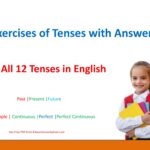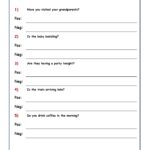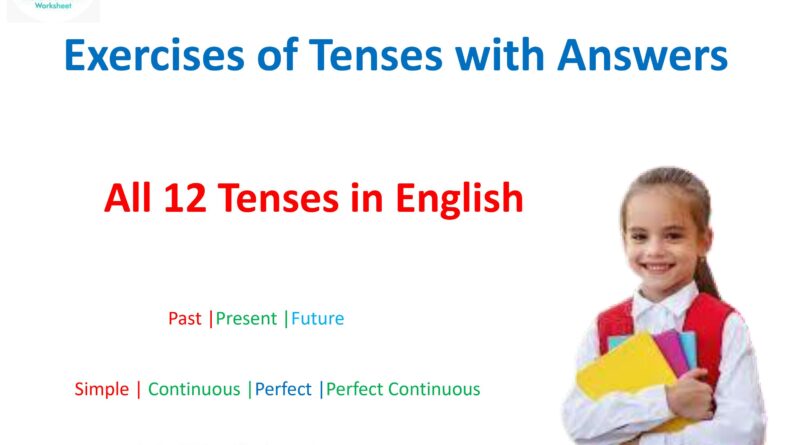Exercises of Tenses with Answers
Mastering English Tenses: Exercises of Tenses with Answers
Understanding and correctly using verb tenses is essential for effective communication in English. Tenses form the core of English grammar, allowing us to express time, sequence, and the relationship between actions. This guide offers comprehensive exercises on tenses, complete with answers, to enhance your learning experience and ensure grammatical accuracy.
Introduction to Exercises of Tenses with Answers
Verb tenses are an integral part of Exercises of Tenses with Answers, indicating when an action occurs. They are categorized into three primary types of Exercises of Tenses with Answers : past, present, and future, each of which can be simple, continuous, perfect, or perfect continuous. These Exercises of Tenses with Answers help us convey when an action happens, its duration, and its completion status, enabling precise and clear communication.

Importance of Learning Tenses
- Clear Communication: Correct use of tenses ensures your message is understood as intended, avoiding confusion and ambiguity.
- Accuracy: Precise use of tenses conveys the exact time and nature of actions, providing clarity.
- Fluency: Mastery of tenses enhances both written and spoken English, contributing to overall fluency and confidence in using the language.
Types of Tenses in :Exercises of Tenses with Answers
Simple Tenses
- Simple Present: Describes habitual actions or general truths.
Example: She reads books every day. - Simple Past: Describes actions that occurred and were completed in the past.
Example: He visited Paris last year. - Simple Future: Describes actions that will occur in the future.
Example: They will travel to Japan next month.

Continuous Tenses
- Present Continuous: Describes ongoing actions happening right now.
Example: She is studying for her exams. - Past Continuous: Describes actions that were ongoing at a specific time in the past.
Example: He was watching TV when the phone rang. - Future Continuous: Describes actions that will be ongoing at a specific time in the future.
Example: They will be waiting for us at the airport.
Perfect Tenses
- Present Perfect: Describes actions that occurred at an unspecified time in the past and have relevance to the present.
Example: She has finished her homework. - Past Perfect: Describes actions that were completed before another action in the past.
Example: He had left the party before it ended. - Future Perfect: Describes actions that will be completed before a specific time in the future.
Example: They will have arrived by noon.
Perfect Continuous Tenses
- Present Perfect Continuous: Describes actions that started in the past and are still continuing or have recently finished.
Example: She has been working here for five years. - Past Perfect Continuous: Describes actions that were ongoing up until another action in the past.
Example: He had been studying for two hours when the power went out. - Future Perfect Continuous: Describes actions that will be ongoing up until a specific time in the future.
Example: By next month, they will have been living here for a year.
Comprehensive Exercises with Answers
Simple Present Tense
- Fill in the blanks with the correct form of the verb:
- She _____ (read) books every evening.
- They _____ (play) football on weekends.
Answers:
- She reads books every evening.
- They play football on weekends.
Simple Past Tense
- Complete the sentences with the correct past form of the verb:
- He _____ (visit) his grandparents last summer.
- They _____ (finish) their homework before dinner.
Answers:
- He visited his grandparents last summer.
- They finished their homework before dinner.
Present Continuous Tense
- Choose the correct form of the verb:
- She _____ (study) for her exams right now.
- They _____ (wait) for the bus at the moment.
Answers:
- She is studying for her exams right now.
- They are waiting for the bus at the moment.
Past Continuous Tense
- Fill in the blanks:
- He _____ (watch) TV when the phone rang.
- They _____ (walk) to school when it started raining.
Answers:
- He was watching TV when the phone rang.
- They were walking to school when it started raining.
Present Perfect Tense
- Complete the sentences:
- She _____ (finish) her project.
- They _____ (travel) to three different countries.
Answers:
- She has finished her project.
- They have traveled to three different countries.
Past Perfect Tense
- Fill in the blanks:
- He _____ (leave) the office before the meeting started.
- They _____ (complete) their tasks before the deadline.
Answers:
- He had left the office before the meeting started.
- They had completed their tasks before the deadline.
Future Tenses
- Fill in the blanks with the correct future form:
- She _____ (attend) the conference next week. (Simple Future)
- They _____ (be) waiting for us at the station. (Future Continuous)
- By tomorrow, she _____ (finish) her report. (Future Perfect)
- By next year, they _____ (live) here for five years. (Future Perfect Continuous)
Answers:
- She will attend the conference next week.
- They will be waiting for us at the station.
- By tomorrow, she will have finished her report.
- By next year, they will have been living here for five years.
Practical Applications of Exercises of Tenses with Answers
Writing Practice
To reinforce your understanding of Exercises of Tenses with Answers, write short paragraphs using different tenses. For example:
- Simple Present: Describe your daily routine.
- Simple Past: Write about a memorable event from your childhood.
- Future Tense: Outline your plans for the
next holiday.
Speaking Practice and Exercises of Tenses with Answers
Practice speaking using various tenses. Discuss your plans, past experiences, and ongoing activities with friends or language partners. This will help you become more comfortable with switching between tenses naturally.
Advanced Exercises of Tenses with Answers
To further enhance your understanding and mastery of English tenses, here are more advanced exercises that combine different types of tenses within sentences and paragraphs.
Mixed Tenses Exercise
- Fill in the blanks with the correct form of the verb:
- She _____ (work) here since 2015 and she still _____ (enjoy) her job.
- By the time you _____ (get) to the party, most people _____ (leave).
- He _____ (read) a book when I _____ (call) him yesterday.
- They _____ (plan) to visit Japan next year, but they _____ (not buy) the tickets yet.
Answers:
- She has been working here since 2015 and she still enjoys her job.
- By the time you get to the party, most people will have left.
- He was reading a book when I called him yesterday.
- They are planning to visit Japan next year, but they have not bought the tickets yet.
Paragraph Writing with Mixed Exercises of Tenses with Answers
- Write a short paragraph using at least five different tenses.
- Last summer, I _____ (decide) to take a trip to Europe. By the time I _____ (arrive) in Paris, I _____ (realize) that I _____ (forget) to bring my camera. Luckily, I _____ (meet) a friendly local who _____ (offer) to show me around and even _____ (lend) me his camera for the day. Now, I _____ (plan) to go back next year and I _____ (make) sure to pack everything carefully.
Answer of Exercises of Tenses with Answers:
- Last summer, I decided to take a trip to Europe. By the time I arrived in Paris, I realized that I had forgotten to bring my camera. Luckily, I met a friendly local who offered to show me around and even lent me his camera for the day. Now, I am planning to go back next year and I will make sure to pack everything carefully.

